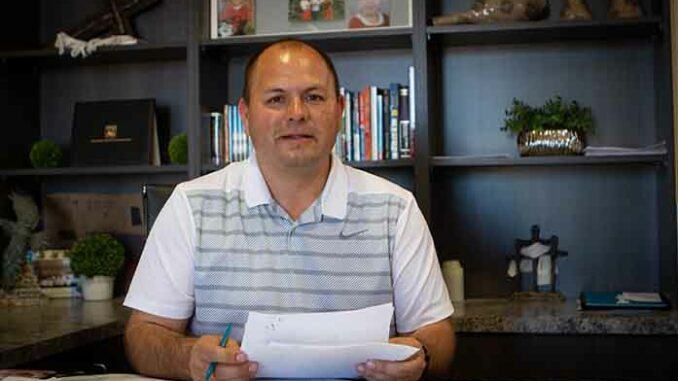
By Chloe Jones and Walter Penate
TOLLESON – The number of migrants dropped off at Revolution Church in Tolleson has nearly doubled since last December, Pastor Raul Salgado estimates.
Migrants are being dropped off by U.S. Immigration and Customs Enforcement after they have applied for asylum and are waiting for their cases to be heard. They usually stay two or three days while Salgado and church volunteers help them find more permanent housing and a way to get there.
Tolleson is a western suburb of Phoenix, with a population of about 7,000.
At the end of November, Salgado said, a pastor of another church asked whether Revolution Church could host an unexpected busload of migrant families ICE had just dropped off.
“I told him yes. And that was four months ago, and we haven’t stopped since,” Salgado said.
In an email to Cronkite News, an ICE spokesman said 14,500 “family unit members” have been processed and released in Phoenix from Dec. 21 through March 5.
It isn’t clear whether the increase is a result of changes in ICE policies or because of the sheer number of migrants seeking asylum or both.
“The dynamics of operational realities are ever-changing and the agency makes adjustments as required to best serve the mission,” the email said. “ICE wants to mitigate strains placed on resources in the local community as we continue to see high volumes of families crossing the border.”
Ismael Garcia Dominguez, who arrived at Revolution Church last week from Guatemala, said he was happy the congregation opened their doors to him. During his journey to the United States, he said Mexican immigration officials took all his money before allowing him to cross the border.
Revolution Church has yet to turn anyone away, but Salgado isn’t sure how long that will be the case.
“We do it because we want to. We do it by faith, we do it because that’s what we’re called to do,” he said.
During the past four months, Salgado estimates his church alone has hosted 2,500 to 3,500 migrants. The church depends on help and donations from volunteers in the community, but the majority of funding comes out of the church’s own pockets.
“It costs money to help these people,” Salgado said. “The water bill goes up. The electric bill goes up. The expenses have increased.”
This is the case for many Arizona churches that take in migrants. Resources are being stretched and it’s difficult for congregants to support families on top of other costs they already have, such as rent and utilities.
Magdalena Schwartz, president of the East Valley Christian Leaders Alliance, has been helping migrants since 1998, beginning her work with police department and immigrant relations. She calls the current situation a humanitarian crisis.
She said she initially was asked to help by an ICE agent who was concerned about the safety of migrant families being dropped off at bus stations, especially the children.
The next day, members of her church prayed and started receiving families, Schwartz said. She now works with about 15 other churches, but the strain has caused many to cut back on the number of migrants they can help, and some have stopped taking them entirely.
“A church before received 100 people; now they can receive about 50,” Schwartz said. “So where do the other 50 people go?”
She said her group has reached out to many churches to find additional housing for these families, but most either don’t respond or lack the resources. She also noted that when a church can’t take in any migrants, they are dropped off at the local Greyhound station, which is a big challenge for migrants who don’t speak the language or know U.S. laws.
Schwartz is in the process of asking state and local government for assistance. She hopes the government can help them support these migrants while they await their asylum requests to be processed.
Although resources are stretched, she has never turned anyone away.
“We made this compromise with God,” Schwartz said. “It’s about people suffering. It’s about children suffering. It’s not about us.”
